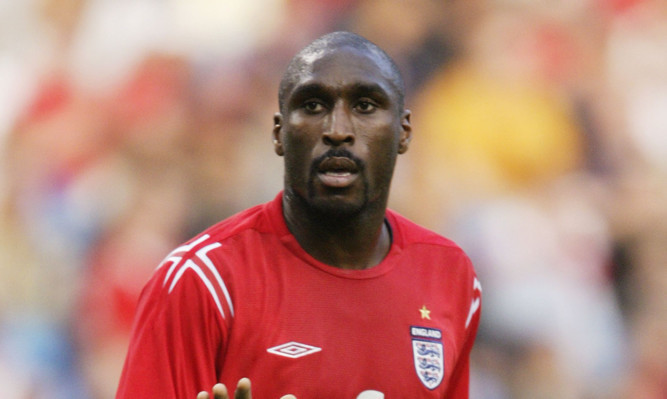
Had things worked out a little differently, Sol Campbell could now be looking back on a 24-month stint in Scotland that included ELEVEN Old Firm derbies.
Rewind to July, 2010 and the 73-times-capped England defender was both a free agent and a wanted man.
Neil Lennon, Celtic’s caretaker manager at the end of the 2009-10 campaign, had just been given the post on a permanent basis.
And having seen Rangers win the previous season’s title with three games to spare, he was desperate to strengthen his side.
Defence was a priority, with Campbell a man able to boast nearly 400 top-team appearances with North London rivals Arsenal and Tottenham Hotspur his
No. 1 target.
Now, in an exclusive interview with The Sunday Post, Campbell has told how close he came to making the move.
He has also admitted his regret at not following in the footsteps of countrymen such as Terry Butcher and Chris Sutton by moving north to sample life as an Old Firm star.
“It’s true. I was only one step away from joining Celtic,” he recalled of his decision to reject the Hoops’ offer of a lucrative two-year deal.
“Neil Lennon really wanted to make it happen, and I did come very close to signing.
“I like Celtic and considered them then, as I do now, to be a top international club.
“By that I mean one right up at the same level as the likes of Chelsea, Manchester United and Arsenal.
“You look at Celtic and Rangers and you are talking about incredible supporters, and a great history and tradition.
“The way they support their players is fantastic. It is thrilling to see.
“I appreciated the fact I was being given the chance to breathe in the incredible atmosphere of those stadiums when they are packed.
“Being given the chance to be involved in Old Firm matches and build up a rapport with those fans.
“And, of course, there are other great clubs in Scotland too, the likes of Aberdeen and Dundee United.
“So it would have been fantastic to play in Scotland even had it been for just one season, rather than two.
“But it did not work out and that is something that, looking back now, I do regret.”
Campbell was one of a trio of big English names Lennon went for in the summer of 2010. David James and Jimmy Bullard were the other men approached.
Yet with none of the trio actually signing, there was cynicism in some quarters the new boss had been merely doing his bit to help boost season-ticket sales.
This at a time, remember, when the Hoops had not only lost the League to Rangers, but were also still trying to get over a wounding loss in the Scottish Cup semi-final to Ross County, then in the Championship.
Campbell, now 40 years old and eyeing a future career in coaching himself, insists that wasn’t the case.
“No, for me it genuinely came close to happening,” he said. “In the end, what stopped me coming up was mainly the idea of playing in a League in which you have to play the same teams over and over again.
“That really didn’t sound too stimulating. So in the end it all came to nothing.
“Newcastle United then gave me the chance to stay in England and that is what I did.”
In addition to regretting the fact he didn’t come north when he had the chance, Campbell also believes it’s a shame the Scottish game struggles
financially in comparison to is counterparts south of the border.
“I follow the Scottish game with great interest, and I believe it is at a good level, even if it is far from the exceptional standards of the English Premier League,” he said.
“Personally, I think the best Scottish teams should make the leap and become an established part of the Premier League.
“It’s only right they should start from the bottom, maybe from Football League Two.
“But I am sure that in a few years they could achieve the same level as the main English clubs.
“It would be good for the entire Scottish football scene, and also for the economy.
“Sponsorships would be increased, with knock-on advantages for television, newspapers and merchandising.
“It would be a great step. Just look at what the Welsh clubs bring to the table.
“Now we have Swansea City in the Premier League and Cardiff City in Championship.
“I am sure that if there were Scottish teams involved in these Leagues, then they would easily be able to attract top international players.
“Unfortunately, at the present moment this is not possible.
“That is no slight on clubs who have made significant contributions to the history of British football.
“Rather, it is just the fact that in Scotland it is impossible to compete in the best and most interesting championship in the world.
“At the moment there is a substantial difference in budget between the EPL and Scottish Premiership.
“Given that is the case, the men who run the SPFL clubs do a great job.
“You compare Scottish clubs with their English counterparts, and you would have to say the enthusiasm and professionalism are identical.
“However, as things stand, the money is just not there.”

Enjoy the convenience of having The Sunday Post delivered as a digital ePaper straight to your smartphone, tablet or computer.
Subscribe for only £5.49 a month and enjoy all the benefits of the printed paper as a digital replica.
Subscribe